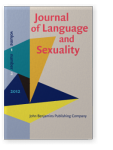Vol. 1:2 (2012) ► pp.179–205
Fluid bodies or bodily fluids
Bodily reconfigurations in cybersex
Previous researchers discussing cybersexuality have been fascinated with the body-less-ness of cybersex. They have focused on the textual productions and (re)formations of the self that are allowed in this space independent of the body. Thus, the cyber becomes the space of transformation and fluidity of the self while the ‘real’ becomes the site of the material, concrete and unchanging body. I posit that dichotomous thinking about the cyber and the real and the text and the body produces an errant concept of the body. Cybersex is rarely a disembodied experience. Text-making cannot create itself free from the constraints of linguistic communities of practice in the “real” world. I challenge the notion that cybersexuality is a sexuality without the body and that the body in the ‘real’ world is stable. I focus specifically on how gay men describe the experience of the anus and anal sex as a means to better understand how the body becomes a site for linguistic marking and reference.
Cited by
Cited by 7 other publications
This list is based on CrossRef data as of 3 june 2024. Please note that it may not be complete. Sources presented here have been supplied by the respective publishers. Any errors therein should be reported to them.
